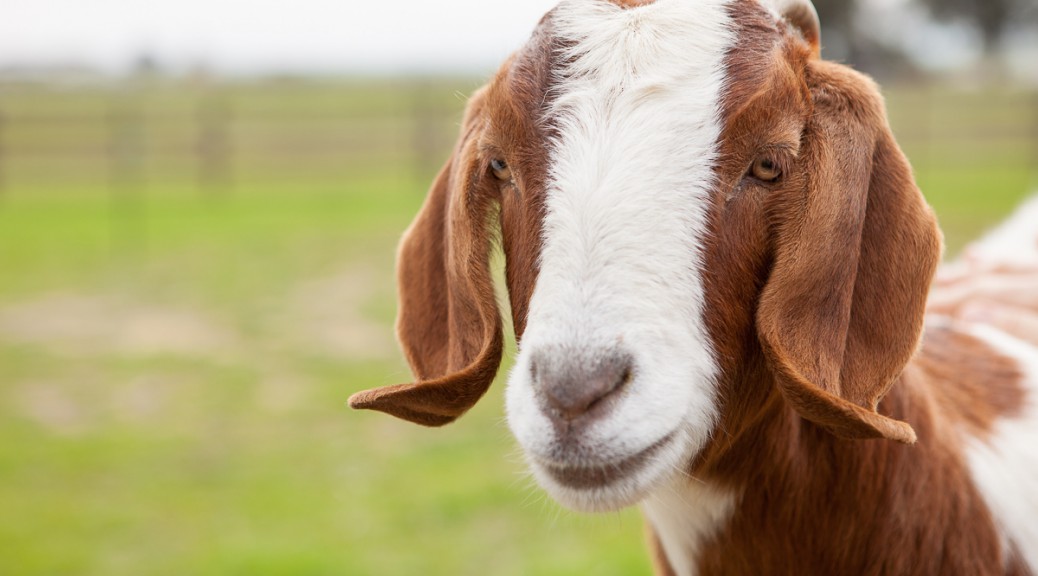[Image: Geeta, a goat at Preetirang Sanctuary.]
Last week, Everyday Feminism (a site I visit frequently and highly recommend) published a video by Celia Edell entitled “Does Feminism Require Vegetarianism or Veganism?” (A text transcript is included; I read the text rather than watching the video.) Based on the title and premise I wanted to respond immediately, but I waited for an important reason: I am not a woman, and it’s not up to me to decide who can call themselves a feminist.
Feminism strives for equality for all genders, but came about specifically to address women’s rights. It is inappropriate for members of the oppressing class – in this case, men – to tell the oppressed how they should behave or identify. Some would make allowances for trans men and transmasculine people like myself*, based on our lived experiences as women. But that same argument is used by TERFs to exclude trans women and transfeminine people from women’s spaces.
So I will not answer the direct question posed in the title, of whether feminism requires vegetarianism or veganism. I will instead point to vegan women who have addressed that question. Aph Ko wrote two essays for Everyday Feminism previously on vegan feminism and black veganism, and just today published an essay on understanding oppression which provides additional context. Charlotte Eure of Striving With Systems (another site I highly recommend) wrote a direct response to the EF piece this week. And yesterday, Vegan Feminist Network republished an essay on vegan feminism, with specific references to the work of Carol J. Adams, by Anna Varga. (Note: Aph Ko, Carol J. Adams, and I will all be speaking at the Intersectional Justice Conference, which starts one month from tomorrow.)
What I do want to address is the lumping together of vegetarianism and veganism. Seeing those two words together really irritates me because the writer is almost always implying two misconceptions:
- Veganism and vegetarianism are both diets
- The issue of harm boils down to “eating meat”
To the first misconception: Veganism is an ethical stance against violence. Eating a plant-based diet is a large and important part of veganism, but not the whole of it. I’ve watched with dismay as the word “vegan” has increasingly gone the way of the word “vegetarian”, the latter of which is sometimes used even by people who eat the flesh of fishes and birds. Sometimes I think fighting for the original, fuller meaning of “vegan” is a lost cause, but I feel compelled to point out misuse of the term regardless.
To the second: Consuming the milk and eggs of animals causes just as much harm as consuming their flesh, if not more so. Dairy cows are forcibly impregnated year after year, have their children taken away from them, and are slaughtered at a young age. Male chicks are routinely killed shortly after birth – by grinding, crushing, or gassing – in the course of egg production, and laying hens are also slaughtered at a young age. Dehorning, debeaking, and castration, all without anesthesia, are also standard procedures on so-called “humane” and organic farms, not just “factory” farms; Peaceful Prairie Sanctuary has the details.
Self-described ethical vegetarians really don’t like to hear these facts about their diets. I count myself among them, having wavered between a vegan and vegetarian diet for over 19 years before finally committing to living vegan. I’m going to keep telling the truth about farmed animals to stop people from claiming ignorance of the impact of their food choices, and I encourage other vegans to do the same.
If folks really don’t have a choice of what to eat – due to poverty or other circumstances – I won’t judge them for eating animal products. But too often the dire circumstances of others are used to excuse the personal habits of those who do have the privilege to choose plant-based meals. People who are truly concerned about increasing access to “vegan food” should consider supporting groups like Food Not Bombs and the Food Empowerment Project.
In conclusion: It’s not up to me to define feminism, but I do have a say when it comes to veganism. Veganism and vegetarianism are not interchangeable. From the perspective of the victims – our fellow animals who are exploited and slaughtered by the billions year after year – consuming dairy, eggs, or “meat” all cause avoidable harm. Even veganism is not “cruelty-free”, but living vegan is a significant and important step toward ending oppression.
* While I am agender, I transitioned to male for legal and medical purposes, so I also accept the label of transmasculine.

This is brilliant Pax. Thanks for sharing 🙂
And thank *you* for all of your wonderful writing. 🙂 Can’t wait to meet you in person at the conference!
Thank you for writing this. I especially liked the statement: “Feminism strives for equality for all genders, but came about specifically to address women’s rights. It is inappropriate for members of the oppressing class – in this case, men – to tell the oppressed how they should behave or identify.” It is an admonition that contains much wisdom that I continue to struggle to incorporate into my ways of thinking/behaving.
I also thank you for stressing the non-interchangeability of veganism and vegetarianism. I think it is always worthwhile to point out this error when it occurs…whether futile or not.